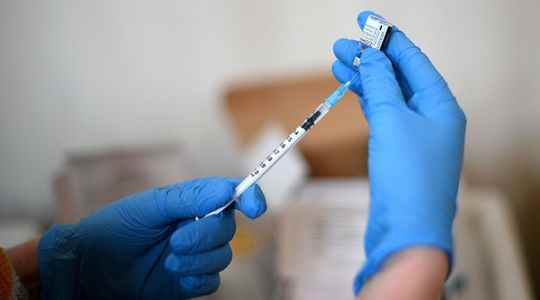Several countries have started to see a drop in cases due to the wave caused by Omicron, the most transmissible variant detected at this stage, even if the number of contaminations in the world continues to climb, and France still displays a very high level. high number of positive cases. Faced with this very contagious variant, laboratories are seeking to develop their vaccine, such as the Pfizer-BioNTech alliance. For his part, the Ethiopian Tedros Adhanom Ghebreyesus is on the right track for a second term at the head of the WHO.
- Pfizer-BioNTech begins clinical trial of vaccine against Omicron
The Pfizer-BioNTech alliance has started recruitment for a clinical trial which aims to test the safety and immune response of their vaccine against Covid-19 which specifically targets the Omicron variant, the two companies announced on Tuesday. The clinical trial involves 1,420 people between the ages of 18 and 55. The boss of the American laboratory Pfizer, Albert Bourla, had declared in early January that the pharmaceutical giant could be ready to request authorizations for the new vaccine, which targets this variant of Covid-19, as early as March.
While current data indicates that booster doses of the original vaccine protect against severe forms of Omicron, the company prefers to err on the side of caution, Pfizer head of vaccines Kathrin Jansen said in the statement. “We recognize the importance of being prepared in the event that this protection wanes over time, and to help address Omicron and other variants in the future,” she said.
For the CEO of the German company BioNTech Ugur Sahin, the protection of the initial vaccine against mild or moderate forms of Covid-19 seems to disappear more quickly against Omicron. The initial vaccine developed by Pfizer and BioNTech had been the first authorized in Western countries, in December 2020. Its design, based on messenger RNA technology, allows it to be relatively easy to modify and update to follow the evolution of mutations specific to new variants.
- WHO: the way is clear for a second term for Tedros
All lights are green for the re-election in May as head of the WHO of Ethiopian Tedros Adhanom Ghebreyesus, the only candidate in the running, after a procedural vote on Tuesday in Geneva. “Words fail me. Very grateful for the renewed support,” the World Health Organization Director General said after the Executive Board vote. “The last two years have been very difficult,” he said, thanking the States for their support during this period marked by the Covid-19 pandemic.
He still has to be formally elected in May by all of the organization’s member states, an election without a foreseeable hitch since he is the only one to stand. During a vote by secret ballot behind closed doors, the members of the Executive Board of the WHO – around thirty countries, including France – formally validated his candidacy, after giving him a great oral. During his presentation, he called on countries to “strengthen the role of WHO at the heart of the global health architecture” and asked them to recognize “health as a fundamental human right”. Dr Tedros, in office since 2017, is highly appreciated, particularly by Africans, for having allowed the gaze of the international community, particularly on the pandemic, to turn more towards this continent.
- “Party gate”: investigation into parties in Downing Street
British police announced on Tuesday that they were investigating several parties organized in Downing Street and within the senior administration during the confinements, at the origin of a serious crisis threatening Prime Minister Boris Johnson. London Police are “currently investigating a number of events which have taken place in Downing Street and Whitehall over the past two years in relation to potential breaches of the rules relating to Covid-19”, the chief said. of the Metropolitan Police.
- Delfraissy expects a lull in spring in France
For the president of the French Scientific Council, Jean-François Delfraissy, the current phase of the epidemic, marked by the Omicron variant, should “land” around mid-March and allow a less tense spring on the health front. “I see things landing more towards mid-March, with a very slow gradual decline in hospitalizations and a number of contaminations which will slowly end up decreasing, with heterogeneity depending on the region”, he indicated.
Beyond that, if he expects the arrival of a new variant in the fall, everything will depend on its “type”, according to Jean-François Delfraissy: “If it is transmissible and again severe, we would be in a very boring situation again”.
- Pacific islands extend lockdowns
The Samoa and Solomon Islands extended their lockdowns on Tuesday in the face of a Covid-19 pandemic that continues to worsen in isolated Pacific island nations, hitherto spared from the virus. Until last week, the Solomon Islands (population 700,000) had recorded no deaths and only 31 cases since the start of the pandemic, but nearly 300 new cases have since been confirmed.
- Royal Mail cuts 700 jobs
The British logistics group Royal Mail plans to cut around 700 management positions to lower its costs after the Omicron variant caused 15,000 absences and costs of hundreds of millions of pounds.
- Weak recovery of European airports
European airports only found 41% of their 2019 passengers last year, against a backdrop of Delta and Omicron variants, a chaotic recovery and insufficient to erase the cataclysm of 2020, according to figures published on Tuesday. The sector is still suffering the consequences of the Omicron wave and “the first quarter will be disappointing”, predicted the European branch of the Airports Council International (ACI Europe).
